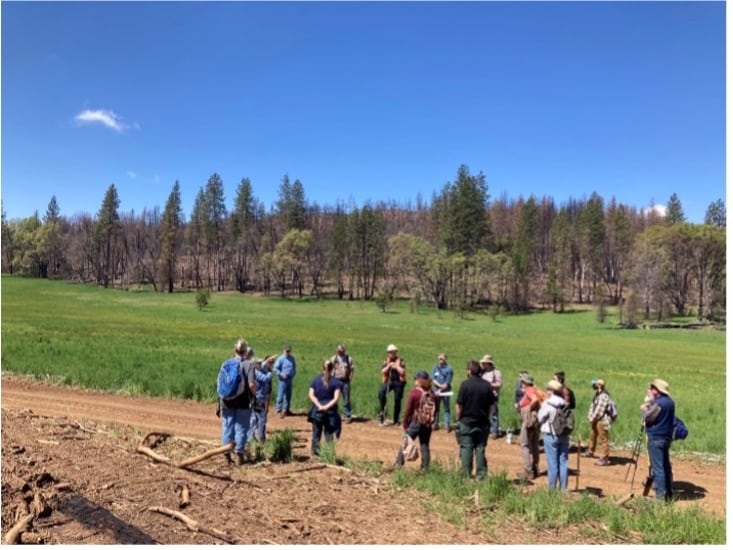Editor’s note: Grace Dean is a Communications Specialist for the University of California Division of Agriculture and Natural Resources (UC ANR) Forest Stewardship Education Initiative. The Post-Fire Forest Resilience Program exists under the Forest Stewardship umbrella and provides communities with an educational toolkit to manage post-fire forested land. In this blog, Grace describes the design and structure of a series of workshops organized by UC ANR to deliver the educational toolkit to communities. Blog cover photo credit: Katie Reidy.
In the fall of 2022, the University of California Division of Agriculture and Natural Resources (UC ANR) launched its first Post-Fire Resilience Workshop series. Since then, the workshop model has traveled around California to Alpine, El Dorado, Fresno, Siskiyou, and Trinity Counties – reaching 97 landowners and community members. The program continues to gain positive feedback and has garnered statewide interest.
The UC ANR Post-Fire Resilience program provides educational resources to non-industrial private forest landowners throughout California who have been affected by wildfire. Headed by Post-Fire Academic Coordinator Katie Reidy, the workshop-style program offers landowners an opportunity to learn ways to manage their forested land, post-fire. Reidy explains that for landowners, the act of returning to post-wildfire property is “an emotional experience. The drastic change can be overwhelming.”
The Post-Fire team understands that for landowners in this situation, the hardest step to take toward post-fire recovery is often the first. Reidy shares that the workshop is therefore “designed to provide stepping stones and educational tools for landowners. It helps them think about how to manage their land for the future; how to encourage the land to grow back.”

Oak Fire workshop participants gather during a field day. Photo credit: Katie Reidy.
Workshop Design and Structure
The workshop series takes place over Zoom, allowing the Post-Fire team to connect with community members over large distances. Weekly sessions consist of information on post-fire issues such as removing hazard trees, reforestation, erosion control, managing competing vegetation and local assistance programs, among others. A variety of speakers and resource professionals supplement each session by sharing their expertise on topics.
At the end of the online Zoom sessions, participants attend an in-person field day. Here, they examine the impacts of fire and observe post-fire management practices on both private and public lands. The in-person field day also provides an opportunity for unstructured conversations among participants and professionals, where landowners are encouraged to ask questions about specific forest management strategies. Field trips consist of multiple stops, a process that aids in visualizing strategies for managing different post-fire problems.
For instance, one stop may highlight high-severity fire impacts with reforestation needs, while another stop may demonstrate ways to manage competing vegetation and resprouting trees. One past participant remarked that the in-person field trips were the most impactful portion of the series. The trips were a place where they could “meet other people in the community facing the same situation we were.”

Napa County Post-Fire Resilience Workshop Participants attend an in-person field trip day. In this photo the topic discussion was about using goats as a tool to manage competing vegetation after the Glass Fire of 2020. Photo credit: Katie Reidy.
It’s true that the Post-Fire workshop program guides workshop participants to find inspiration in regional success stories. Yet participants leave the program with so much more: a newfound or increased knowledge base and network that will help their projects succeed. The camaraderie that occurs in the workshop is powerful, shares Daylin Wade, Post-Fire Staff Research Associate.
Wade expresses that the program “creates an opportunity for the community to learn from each other in addition to experts. Learning happens through discussions amongst participants that augments learning from the speakers.” Personal accounts of people’s experience with fire recovery are valuable for other participants to hear, she notes. Wade shares that at a previous workshop, “one landowner who had experienced fire three years ago provided learning and insights to a landowner who experienced fire only six months ago.”
The impacts of local wildfire events focuses the workshop experience, which is not simply a place to learn, but a place to build community resilience. Future workshop participants can expect to experience these connections between inspiration and action and leave the workshop with a new network of support.
The next Post-Fire Resilience workshop series begins January 30, 2024! The team is inviting private forest landowners, agency folks, and interested community members in Santa Clara and Santa Cruz counties to their next workshop cohort. The wildfire of focus will be the 202 CZU Complex Fire. Participants of the workshop will engage in weekly workshop sessions over Zoom on Tuesday nights from 6 – 7:30pm from January 30th– March 12th, with in-person field trip days on March 22nd and March 23rd. Interested forest landowners, community members, local agencies or tribal members in Santa Clara and Santa Cruz counties can register here. There is a registration fee of $25. Any questions should be directed to Katie Reidy, The Post-fire Forest Resilience Program Coordinator at: kkreidy@ucanr.edu.
****

